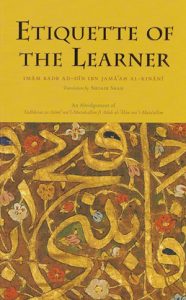Etiquette of the Learner

Author: Imam Badr ad-Din ibn Jamaah al-Kinani
Translator: Shoaib Shah
Publisher: Turath Publishing
Year of Publication: 2015
Print Length: 105 pages
Genre: Islamic Studies / Theology, Ethics and Philosophy; Reflection and Self-Development
Topic: Islam, Qur’an, Prophet Muhammad ﷺ, Ethics & Morality, Education, Scholarship & Knowledge
Etiquette of the Learner is extracted from Qadi Ibn Jama’ah’s major contribution to the literature of adab: Tadhkirat as-Sami wa’l-Mutakallim fi Adab al-‘Alim wa’l-Muta’allim (A Memorandum to the Listener and the Speaker on the Etiquette of the Scholar and the Learner).
It provides a detailed guide for students of knowledge to the attitude and practice they should cultivate in order to bring their endeavour in line with the instructions and example of the Qur’an and Sunnah. Whether they are embarking upon the rigorous quest in pursuit of command of the Islamic sciences, or simply seeking to enhance their understanding of the religion, this work will impress upon readers the indispensable but oft-forgotten principle: etiquette comes before seeking knowledge, thus enabling them to truly benefit from their studies.
Table of Contents
Publisher’s Foreword
Introduction
1. The Excellence of Knowledge, Scholars and the Learning and Teaching of That Knowledge
What Allah says about knowledge and scholars / What the Messenger of Allah ﷺ said about knowledge and scholars / What the Companions and pious predecessors said about knowledge and scholars / The criteria of a scholar
2. Etiquette of a Student within Himself
1. Purifying the heart of all evil and impurities / 2. Correcting the intention for Allah Most High / 3. Removing obstacles in the way of seeking knowledge / 4. Being content with a little and not pursuing wealth / 5. Valuing time and the best times for different tasks / 6. Eating minimal food / 7. Choosing the way of piety and taking Shari’ah concessions / 8. Decreasing foods that have an adverse effect / 9. Decreasing sleep and resting the body / 10. Choosing the right friend
3. Etiquette of a Student with His Teachers
1. Choosing a teacher from pious scholars / 2. Obeying the teacher and being humble before him / 3. Honouring the teacher and praising him as he deserves / 4. Not forgetting the teacher’s favours / 5. Being patient when reprimanded / 6. Thanking the teacher for his guidance and assistance / 7. Asking permission to enter in a disciplined manner / 8. Sitting in front of the teacher with respect / 9. Speaking politely with the teacher / 10. Responding to the teacher and listening attentively / 11. Not competing with the teacher / 12. Giving to and taking from the teacher / 13. Walking with the teacher and speaking with him
4. Etiquette of a Student in His Studies and Lessons
1. Prioritising the Noble Qur’an, followed by the principles of every science / 2. Sticking to a single methodology in the beginning / 3. Confirming and correcting what is memorised / 4. Being occupied with collections of narrations and the study of their chains / 5. Studying detailed commentaries after the treaties / 6. Frequenting the teacher’s lectures / 7. Sitting in the lectures / 8. Interacting with colleagues during the lecture / 9. Asking for clarification of difficult concepts / 10. Waiting in turn to read / 11. Not pressuring the teacher to read when he is occupied / 12. Beginning the lecture with supplications for the teacher and the author of the book / 13. Encouraging others to study
5. Etiquette with Books
1. Acquiring the necessary books for study / 2. Lending and borrowing books / 3. Placing books correctly when reading and when not reading / 4. Checking books before returning them / 5. Before writing in books / 6. Improving handwriting / 7. Editing and verifying the text of an Arabic book / 8. Writing references in Arabic books / 9. Writing notes / 10. Distinguishing the titles and sub-headings from the main text / 11. Crossing out mistakes
6. Etiquette in the Institute
1. Enrolling at the appropriate institute / 2. Finding pious teachers and tutors / 3. Being aware of responsibilities towards the institute / 4. Strictly abiding by the residential regulations of the institute / 5. Not wasting time during studies / 6. Etiquette with students and staff of the institute / 7. Choosing the right roommate and the most appropriate room to stay in / 8. Etiquette within the institute / 9. Actions one should avoid in the institute / 10. Not disturbing or intruding on other residents / 11. Etiquette in attending lectures
Bibliography

Imam Badr ad-Din ibn Jamaah al-Kinani was a 13th century eminent scholar of hadith, Jurisprudence and Qur’anic exegesis. Born in 639 AH/1241 in Hama, he went on to become a distinguished Shafi’i jurist under the Mamluks. Throughout his lengthy service in the judiciary, he was known for his virtuousness, praiseworthy conduct, and just rulings.
Source: https://www.goodreads.com/author/show/16305461.Imam_Badr_Ad_Din_Ibn_Jama_ah_al_Kinani
More from Imam Badr ad-Din ibn Jamaah al-Kinani in this library, click here.

Shoaib Shah is a teacher and translator. He studied in the Jameah Uloomul Qur’an darul ulūm seminary, Leicester under the respected Shaykh al-Hadith, Muhammad Ādam (May Allah preserve him) and graduated in 2008. He has taught a number of different topics over the years, but primarily lectures on the Sciences of the Qur’an and tafsīrs, such as al-Jalālayn and at-Tashīl. While studying he began translating and editing classical works with Turath Publications in numerous fields of Islamic sciences.
Source: https://wiseenglishacademy.org/team/shaykh-shoaib-shah/
More from Shoaib Shah in this library, click here.
